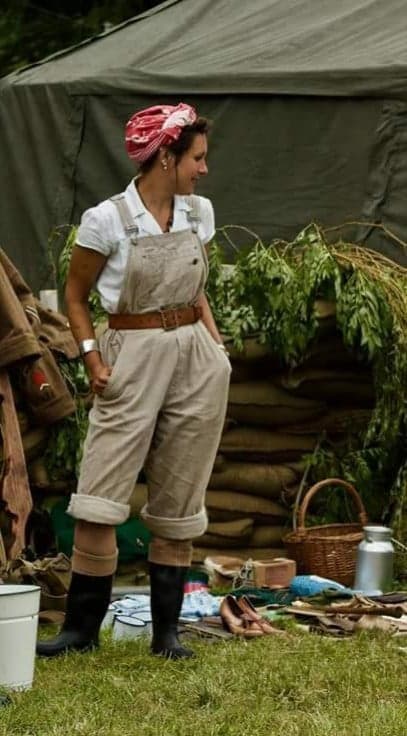The Second World War, the largest and most savage conflict to date in the history of the world, began in 1939 and ended officially in 1945. Still within living memory, this war saw the entire world fighting for peace, freedom and an end to the tyranny of German allied expansionism.
After the First World War (which people at the time had named the “War to end all wars”) Germany was a mess. Its empire destroyed, its economy foundering and its people humiliated, the country was desperate for a strong leader to build a new nation and give back its pride. It was a natural breeding ground for extremist views and scapegoating; the National Socialist Party (abbreviated in English as the Nazi Party) appeared to offer a solution to Germany’s problems through worker’s rights, a strong economy and a pure German nation.
Of course a pure German nation (if there ever was such a thing) did not include anyone who didn’t meet the perfect ideals of the German race. Blonde hair and blue eyes, perfect physical health, a strong moral compass and of course a German heritage were essential if you wanted to live and thrive in the new Germany. Anyone not meeting this ideal was considered lesser, undesirable, and eventually unnecessary. Whilst the most famous victims of German nationalism were the Jews, the Nazis also persecuted Slavs, Romanies (Gypsies) and people with dark skin, homosexuals, those with physical or mental disabilities and anyone who wasn’t seen as “useful” or didn’t agree with the Nazi party’s views.

From World War I to World War 2

The First World War had ended with the treaty of Versailles, which not only ordered Germany to disarm and lose territory, but which Germany felt blamed them unfairly as the cause of World War 1.
Prior to the Wars, Germany had ruled a vast Empire including what today are parts of Poland, France, Denmark, Belgium and Lithuania. After World War 1, the Empire was broken up and Germany forced to pay huge amounts of money in reparations. Germany and its allies; the Russian Empire, the Austro-Hungarian Empire and Bulgaria, lost territory and were split into new countries including what became Poland, Czechoslovakia, Austria, Lithuania, Hungary and Romania.
The sense of injustice at being blamed for the war and especially at losing long-standing territories, gave the Nazis something else to latch onto: the desire for their land back, especially that which they had lost to the new Poland.
The Final Straw
Had the Germans kept their policies in their own country, the war might never have happened. But the leaders of the nation wanted more than just Germany – they wanted create a new Germanic Empire that would be known as the Third Reich. Germany began pushing its boundaries with the League of Nations (a kind of proto-United Nations), rearming itself in secret and then annexing Austria and parts of Czechoslovakia in 1938. Sensing that they would be next, Poland had made a treaty with Great Britain and France for protection. When Germany invaded Poland in September 1939, Great Britain and France were forced to respond, and war was officially declared on 1st September 1939.
A True World War
Of course Britain, France and Germany were not the only countries involved, or it would not have been a World War. Before the declaration of war, Russia had agreed to help Germany take Poland and other bordering countries in exchange for territory, Italy had already invaded Ethiopia, and Japan was attempting to take over China. Italy, Japan and Germany would shortly ally themselves, sharing common goals of empire, anti-communism and nationalism. Few countries stayed neutral, although some did, including Spain, Switzerland and Ireland. Most of the Commonwealth (the former British Empire) allied with Britain, including Canada, Australia, New Zealand and India.


In 1941 Germany reneged on its treaty with the Soviet Union and invaded, causing Russia to defend itself, and Japan’s bombing of Pearl Harbour brought the US into the fray. At its peak, the war was fought by over 30 countries and over 100 million people, with an estimated 55-80 million deaths, both military and civilian.
The Home Front
Thanks mainly to our island status, enemy troops never invaded Britain, but the war still keenly affected the country. Air raids with both incendiary and explosive bombs shattered major cities, conscription sent young men off to die on battlefields in other countries, and for those left behind life was forever changed. Women entered the workforce like never before, staffing the factories, farms, mines and mills and doing the work that had always been traditionally male areas. Children were evacuated from cities to the country, separated from their families to keep them safe from bombs aimed at industrial and military targets. Rationing of food and essentials was enforced as supply lines and trade routes that had existed for thousands or years were suddenly cut off, and Britain had to become self-sufficient for the first time since the Bronze Age.
Slogans such as Dig for Victory, Make Do and Mend, and Walls Have Ears became commonplace, reminding people that the country had to pull together to produce enough for everyone’s needs at the same time as keeping the military machine turning. Hiding from air-raids in underground shelters, carrying a gas mask and keeping the house lights off after dark all became part of the daily routine for British families.

how the war was won

Germany’s attempt on Russia turned out to be disastrous. Although there were a few early victories, the size of the Soviet Union and the harsh winters meant that Germany was having to throw more and more resources onto the battlefront without making any headway, losing thousands of troops in the process. Massive resources were also being used on another front: the extermination of the Jews and other undesirables. It’s estimated that up to 17 million people died in concentration camps, ghettos and as slave labourers, because of their religion, sexuality, disability, political views, culture or race.
The logistics of waging an internal ideological war as well as an external military one took vital resources away from the war effort. Soldiers who could have been fighting were instead working as camp guards, doctors who should have been treating injured soldiers were experimenting on camp occupants, and most of all, millions of human beings who could have been working for the German war effort were instead being starved, beaten, shot, tortured, gassed and worked to death by their own countrymen.
Slowly the allies gained the advantage over an overstretched and overreaching enemy. One by one, occupied countries in Europe were liberated by allied forces until Berlin itself fell. The war had raged over Europe, Africa and Asia, and involved people from every inhabited continent in the world, but the defining end point was the atomic bombing of Japan. The battle for weapons was waged as fiercely as the battle for land, and the discovery of nuclear fission allowed the US to drop two atomic bombs on Hiroshima and Nagasaki in 1945, effectively ending the war in the east.

The Home Front

Luckily for you, the Germans have not made it to Britain yet, but they are just across the sea in France and they could be here any minute! Keeping the country going when most of the men are off at war is now going to be your job. So make sure you Dig for Victory, growing food to supplement your rations. Do you know how a ration book works? There’ll be no more begging mum for sweets when you’re out shopping, you only get 350g every 4 weeks! Could you survive on rations? Maybe you’ll have to keep some chickens or a pig in your garden so you have enough to eat. You’ll have to learn how to sew to mend your clothes – if they wear out just patch them. And your mum will probably be out at work in the factories all day doing the jobs that dad used to do, so you’d better learn how to take care of yourself pretty fast! Can you put on a gas mask in less than 9 seconds? You’d better practice because if not you’ll be dead. And if you hear that air raid warden make sure you know where the nearest shelter is and how to get there in the dark, because once the sun goes down the streetlights and house lights will all be off so that the German bombers can’t see where the towns are. That’s if you’re not evacuated to the countryside to avoid the bombings – you might have to live on your own with complete strangers, and they might not even be very nice…
Women! Know your place!
It’s no longer in the kitchen, ladies, it’s in the factories, on the farms, the mills and the mines! Turn in your high heels for welly boots, join the Women’s Land Army and become a Land Girl. Learn how to drive a tractor, look after farm animals, lay a hedge, cut down trees and milk the cows. Catch rats and mice to stop them eating your grain stores, learn how to forage and hunt, plough the fields and shear the sheep.
Or perhaps you’ll join up yourself? Become part of the Women’s Auxiliary Army or Airforce and support the fighting men as a radio or radar operator, anti-aircraft gunner or in the military police. Fly cargo planes or operate the enormous searchlights keeping watch out for enemy planes, drive tanks or fire engines, or if you’re medically inclined join the nursing corps out treating and evacuating the sick and injured in the war zones. With this war, every hand is essential! And of course, when it’s all over, you’ll be happy to go back to being a dutiful little wife, cooking and cleaning at home, right? Right?


Leave a Reply